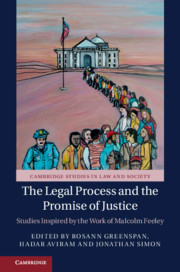Book contents
- The Legal Process and the Promise of Justice
- Cambridge Studies in Law and Society
- The Legal Process and the Promise of Justice
- Copyright page
- Contents
- About the Contributors
- Introduction: Past as Prologue
- Part I The Process Is the Punishment
- 1 Adversarial Bias and the Criminal Process: Infusing the Organizational Perspective on Criminal Courts with Insights from Behavioral Science
- 2 Malcolm Feeley’s Concept of Law
- 3 Process as Intergenerational Punishment
- 4 The Process Is the Problem
- Part II Court Reform on Trial
- Part III Judicial Policymaking and the Modern State
- Part IV Political Liberalism and the Legal Complex
- Index
- Books in the Series
- References
2 - Malcolm Feeley’s Concept of Law
from Part I - The Process Is the Punishment
Published online by Cambridge University Press: 18 April 2019
- The Legal Process and the Promise of Justice
- Cambridge Studies in Law and Society
- The Legal Process and the Promise of Justice
- Copyright page
- Contents
- About the Contributors
- Introduction: Past as Prologue
- Part I The Process Is the Punishment
- 1 Adversarial Bias and the Criminal Process: Infusing the Organizational Perspective on Criminal Courts with Insights from Behavioral Science
- 2 Malcolm Feeley’s Concept of Law
- 3 Process as Intergenerational Punishment
- 4 The Process Is the Problem
- Part II Court Reform on Trial
- Part III Judicial Policymaking and the Modern State
- Part IV Political Liberalism and the Legal Complex
- Index
- Books in the Series
- References
Summary
Malcolm Feeley’s The Process Is the Punishment has undoubtedly reached canonical status. Perhaps because Feeley bestowed it with a dangerously catchy title, the book is often cited for a fairly straightforward empirical conclusion: the burdens and hassles that defendants experience in lower criminal courts as their cases are processed more often than not outweigh formal sanctions imposed when the cases are concluded. Behind that conclusion – in fact premising it – are a set of complex and nuanced propositions about how we ought to conceptualize the law and what that conceptualization means for our study of it.
- Type
- Chapter
- Information
- The Legal Process and the Promise of JusticeStudies Inspired by the Work of Malcolm Feeley, pp. 36 - 54Publisher: Cambridge University PressPrint publication year: 2019
References
- 1
- Cited by

